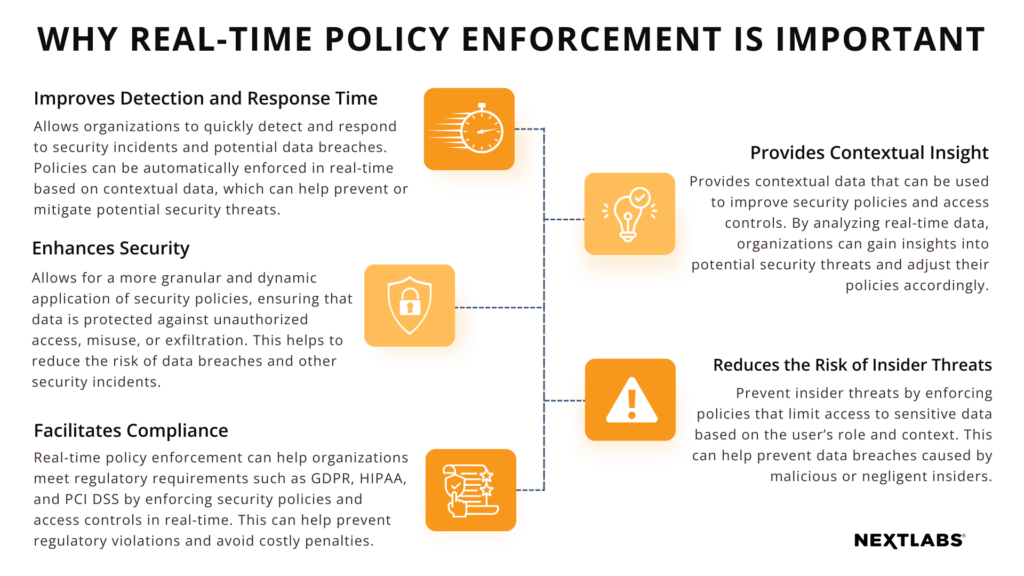Policy enforcement in data security refers to the process of ensuring that the security policies and procedures implemented by an organization are followed consistently by its employees, partners, and stakeholders. It involves using various technical and administrative controls to prevent unauthorized access, use, disclosure, modification, or destruction of sensitive information.
Policy enforcement is critical for data security because it helps to minimize the risks associated with data breaches, cyber-attacks, and other security incidents. Without effective policy enforcement, security policies and procedures can become meaningless, and data security can be compromised.
Some examples of policy enforcement measures in data security include access controls, data encryption, externalized authorization, network security. These measures help to ensure that data is protected against internal and external threats and that any security breaches are detected and mitigated quickly.
Moving To Real-Time Policy Enforcement
Real-time policy enforcement is a more dynamic and responsive approach to policy enforcement, as policies are applied and enforced in real-time based on the specific context of data access or use. This can provide better security and help prevent data breaches by enabling more granular and context-aware security policies.
Real-time policy enforcement is crucial for data security in today’s rapidly evolving threat landscape. Here are some key reasons why real-time policy enforcement is important:
- Improves Detection and Response Time: Allows organizations to quickly detect and respond to security incidents and potential data breaches. Policies can be automatically enforced in real-time based on contextual data, which can help prevent or mitigate potential security threats.
- Enhances Security: Allows for a more granular and dynamic application of security policies, ensuring that data is protected against unauthorized access, misuse, or exfiltration. This helps to reduce the risk of data breaches and other security incidents.
- Facilitates Compliance: Real-time policy enforcement can help organizations meet regulatory requirements such as GDPR, HIPAA, and PCI DSS by enforcing security policies and access controls in real-time. This can help prevent regulatory violations and avoid costly penalties.
- Provides Contextual Insight: Provides contextual data that can be used to improve security policies and access controls. By analyzing real-time data, organizations can gain insights into potential security threats and adjust their policies accordingly.
- Reduces the Risk of Insider Threats: Prevent insider threats by enforcing policies that limit access to sensitive data based on the user’s role and context. This can help prevent data breaches caused by malicious or negligent insiders.
Right Access at the Right Time
Today’s complex, distributed hybrid, and/or multi-cloud computing environments present unique security challenges that should be addressed through the use of new data security tools and technologies. The need to understand where data is stored, active monitoring of who has access to it, and preventing risky behavior which might potentially harm file movements are a few of the challenges. The process can be made easier by comprehensive data protection solutions that let businesses implement a centralized strategy for real-time policy enforcement and monitoring.

Having a centralized policy-based access management solution that provides automated real-time policy enforcement is key to enabling ease of management and increasing business agility by eliminating data access bottlenecks. With the above, enterprises can digitally manage policies in real-time to govern data classification, access, sharing, and use to automate security and compliance procedures to streamline business processes and improve information control at the same time. This enhances organizational agility and leaves the company in a much better position to respond to always-changing business conditions and regulatory environments.
To learn more about centralized policy-based access management, visit the CloudAz page.

